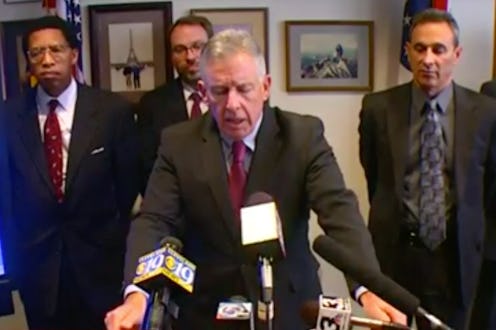News
Ohio Prosecutor Says This Fact Was "Indisputable"

More than a year after Tamir Rice, a 12-year-old Cleveland boy, was killed by a police officer, a grand jury decided not to indict Timothy Loehmann and Frank Garmback, the officers involved in the shooting. Timothy J. McGinty, the Cuyahoga County prosecutor, explained in a news conference Monday that, while the situation is tragic — "a perfect storm of human error" — the facts did not show that "the officers acted outside the constitutional boundaries."
Rice was carrying a toy gun outside a recreation center when someone called 911. The two officers responded in a cruiser, pulling up next to Rice. Officer Loehmann got out of the vehicle and almost immediately shot the boy. Surveillance video caught the incident on tape, and it was widely circulated online.
Prosecutor McGinty claimed that close review of the video shows that it is "indisputable" that Rice pulled out the replica gun from his waist and that the officer had "reasonable belief," given his training, to fear for his life. McGinty said that county prosecutors had tried to explain why the officers wouldn't be indicted to Rice's family:
We explained to [Tamir Rice's mother] that this was a difficult decision, but also that to charge police, even in a situation as undeniably tragic as the death of her son, the state must be able to show that the officers acted outside the constitutional boundaries ... Given this perfect storm of human error, mistakes, miscommunications ... the officers did not commit criminal conduct.
McGinty reiterated that the officers reacted as they were trained, and that they lacked vital information while responding — such that the shooter was likely a juvenile, and that the gun was probably fake. The 911 dispatchers did not include those details in the initial radio call to the officers.
McGinty emphasized that Officer Loehmann was a rookie. He further noted that the Rice's size made him seem older than he was (he was 5'7" and weighed 175 pounds). Also he suggested that even if Rice had been trying to turn the gun over to the officer or show it was a toy, the motion to reach for it would have signaled the officer to fire.
The grand jury had been meeting since mid-October. To indict, it is not necessary to prove that those on trial are guilty — just that a crime may have been committed. McGinty said at the news conference that he and his office had recommended that they not to indict the officers. The grand jury members made the final decision.
Even before the decision was announced, a lawyer for the Rice family expressed doubt that the officers would be indicted. Subodh Chandra, the Cleveland attorney representing the family, called it an injustice. "This is apparently how long it takes to engineer denying justice to a family when the video of the incident clearly illustrates probable cause to charge the officer," she told the Associated Press.
Through a statement provided by their attorney, Rice's family said Monday that they were disappointed but not surprised to hear that the officers would not be indicted. They accused McGinty of "abusing and manipulating the grand jury process to orchestrate a vote against indictment."
After McGinty's statement, Assistant Cuyahoga County Prosecutor Matthew Meyer showed further evidence to bolster the decision not to indict. He included pictures of Rice holding the toy gun and aiming it at others outside the recreation center, as well as comparing the toy gun to a real gun. He also played the original 911 call, in which the caller suggests that Rice is probably a juvenile and that the gun may not be real.
In the end, whether it's a "perfect storm" or a crime, this cannot happen again — no matter what "indisputable" evidence the county prosecutors point to.